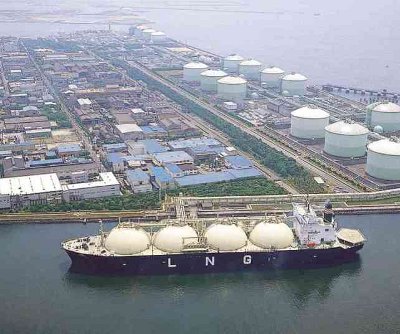Ukraine has been a crown jewel of the Russian empire since the 1800s. It was part of the Soviet bureaucratic empire, and given this history of assimilation within Russia, it is no surprise that President Vladimir Putin wishes to keep it under his thumb.
 It’s no secret that Putin has a special eye on Ukraine and is trying to prevent the fellow Slavic country from making stronger ties with the European Union. That’s why Russians offered Ukrainian leaders a lucrative package of $15 billion in loans, along with steep cuts in natural gas prices.
It’s no secret that Putin has a special eye on Ukraine and is trying to prevent the fellow Slavic country from making stronger ties with the European Union. That’s why Russians offered Ukrainian leaders a lucrative package of $15 billion in loans, along with steep cuts in natural gas prices.
Ukraine has long been subject to Russia’s high monopoly prices — paying some of the highest prices in Europe.
When a trade agreement with the EU was called off, massive protests erupted all over Ukraine in defiance of the decision. Many within the Ukraine hope the country further aligns itself with the West, but other elements in the country are hoping to become the Switzerland of Eastern Europe, according to analysis from Market Realist.
Ukraine collects $3 billion in transportation fees from the Nord Stream pipeline, a natural gas route that connects Russia and Germany. Ukraine hopes to become an independent player, but a closer relationship with the West is ideal for many nationals with anti-Russian sentiment or who want a better economic future for Ukraine. Angry protesters accuse President Viktor Yanukovich of selling out to the Russians for a quick-fix remedy to Ukraine’s faltering economy.
But if Ukraine were to become closer to the West, this would provide an excellent opportunity for the U.S. should the Department of Energy approve more export applications.
Potential Goldmine
Countries like Ukraine and Poland are looking to get out from under Russia’s monopoly hold. If the U.S. were to ease its unofficial caps on exporting natural gas, it would be the perfect opportunity to provide competition to the Russians while also bringing in extra revenue.
Natural gas exports can bring in anywhere between $15.6 billion and $73.6 billion of income, while adding over 400,000 jobs to the economy.
The U.S. could make inroads not only into the former Eastern Bloc, but into Europe as a whole. However, Russia’s monopoly hold on Europe is beginning to wane due to lower demand from stagnating economies, forcing the Russians to look East, which is another market that could be captured with the might of full export capacity from the United States.
But would Ukrainians accept natural gas from the United States?
It was only a year ago when Ukraine looked to the U.S. for natural gas because of low prices, but this may change with the Russian deal. Yanukovich has unequivocally stated that he does not want any Western interference in Ukraine’s economic problems.
Accepting the deal means Ukraine will become closer to Russian gas operations, further isolating the country from the West and the United States by extension. And Yanukovich has signaled interest in accepting some terms of the Customs Union, an association agreement within Eastern Europe that many critics call a sphere of influence hearkening back to the old days of the Soviet Union.
Ukraine is more isolated from the West by rejecting trade agreements and accepting Russian offers, but things could change in the future, since many see the Russian deal as a band-aid solution.
We could possibly see Ukraine coming back to the West in the long run if tensions with Russia increase.
Our analysts have traveled the world over, dedicated to finding the best and most profitable investments in the global energy markets. All you have to do to join our Energy and Capital investment community is sign up for the daily newsletter below.
Ukrainian Investment
When it comes to U.S. investment in Ukraine, we are a long ways away from seeing that happening. But investors must also pay attention to government restrictions at home.
Companies like Dominion Resources (NYSE: D), Cheniere Energy (NYSEMLT: LNG), and Freeport LNG have won LNG export approval, but only on a conditional basis. Twenty applications remain in limbo.
Dominion Resources fostered deals with the Japanese before its application was approved, and Cheniere forged a deal with Britain in shipping LNG to supply energy to millions of homes.
But none of these companies have made way into the Ukrainian market, and they are most likely going to be crowded out by the Russian deal.
If things change, Canada will be in a much better position to export natural gas to Eastern markets like Ukraine, since the country has no restrictions on exporting to non-FTA countries.
Until the U.S. changes its export policy, Canada is a country to keep your on eye to see if shipping natural gas to Ukraine is a successful business model. When it comes to U.S. exports, watch for any companies that have been approved to ship LNG, along with new companies that will receive approval in the future and other companies that want to ship natural gas abroad.
All you can do is wait.
If you liked this article, you may also enjoy:




